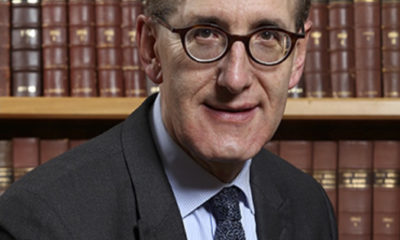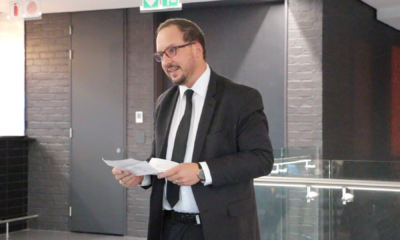
OpEds

Getting your COVID-19 jab is a duty, not a right
The drop in cases of new COVID-19 infection in the community in the past week is like the loosening of a noose around the necks of my colleagues and myself, and though we’re still diagnosing new cases daily, fear of a further exponential increase has abated.
As we start to sigh the first breaths of relief, our imagination has started to venture into the prospect of a fourth wave, which as professionals, perhaps we wouldn’t mentally survive.
During this week, when my mind has wandered into these overwhelming thoughts, I’m instantly reassured that we now have a vaccine for COVID-19. It’s our golden armour in this disastrous pandemic, and the single most effective tool we have to get our lives back to normal.
Yet, I’m intrigued by the number of people I still consult on a daily basis who are truly undecided as to whether or not they will be enrolling for a COVID-19 vaccine. Some cite well thought-out arguments that deter them from enrolling for vaccination. Others have, in fact, enrolled, but an emotional barrier with fear at its foundation prevents them from taking the next step.
To date, there has been no scientifically robust data that has called to question any of the readily available vaccines. When I’m posed a question like, “Is it worth the risk of having a COVID-19 vaccine if it can cause blood clots or infertility?”, my logical reply is almost always with the counter question, “Have you considered the risks of COVID-19 pneumonia or being a conduit for COVID-19 pneumonia in someone else? Have you weighed those risks against that vaccine risk that concerns you?” Life is fraught with daily risks, and we navigate the best balance of these risks in our daily routines. For example, we wouldn’t accept the risk of going without food against the risk of crossing a busy road to collect the food, even though both risks are real. The same logic should be employed here.
Six months into worldwide vaccine deployment, just less than four billion doses have been given. This sample size certainly allows us to quantify risks. One in 100 000 Johnson & Johnson and AstraZeneca recipients developed a clotting disorder called thrombocytic thrombocytopaenia. The occurrence of myocarditis (inflammation of the heart) in Pfizer patients has been pitched at about one in a million. These numbers are statistically so insignificant, it’s almost more responsible not to mention them at all in my opinion. The risk of complications of the anxiety caused by their discussion alone may be higher than the original risks themselves.
So, why are we still struggling to convince a significant proportion of the larger community to get the jab? German psychologist Professor Cornelia Betsch proposed five c’s as factors that deeply affect vaccine uptake. All of these are important here.
Confidence: trust in the vaccine’s efficacy and safety, and confidence in the people rolling them out. We are making great strides here, particularly with community and religious organisations now opening vaccine centres. We need to produce more paper reading material about vaccine safety in different languages, and rely less on digital education only.
Complacency: whether the disease is considered a serious risk. The third wave and its devastation has shifted most minds here. We need to focus on the appreciation that healthy young people can become significantly unwell too.
Calculation: weighing up the costs and benefits. We need to encourage those reluctant to be vaccinated to do this exercise themselves. The risks of COVID-19 complications are big. The risks of vaccines are, at most, little.
Constraints: availability and ease. Justifiable or not, we have failed here. However, South Africa can be proud of its catch-up and current stock availability.
Collective responsibility: the willingness to protect others from infection through one’s own vaccination. I will focus the rest of the article on this responsibility.
COVID-19 has taught us the paramount lesson that we are responsible for one another. This spans from the responsibility of informing contacts if you test positive, to the responsibility of supporting infected individuals with medication to prevent them from infecting others, to the responsibility of emotional support for bereaved families, to now, the biggest responsibility of getting vaccinated. This is your greatest moment of responsibility to others in COVID-19, even if you believe you are taking on “vaccine risk”.
It’s so clear to me that the only way out of this pandemic is for us to stop framing our COVID-19 lives as individuals, and embrace the responsibility of being a member of a community. We need to take up our duty to protect others. Getting vaccinated to protect others shouldn’t be seen as a mere act of altruism. In fact, it’s the only way we will rebuild our communal life and develop population immunity. Ironically, it’s this focus on others will that will enable us as individuals to resume our own social interactions and a normal lifestyle. The true test of COVID-19 is seeing beyond one’s own immediate protection.
If you are in still in doubt as to whether or not to get vaccinated, you aren’t alone. You have every right to ask questions. But COVID-19 vaccinations aren’t about rights. They are foremost about a deep responsibility and personal duty to society as a whole. No formidable soldier has stood at the frontlines of a battleground worrying about his rights. You have a responsibility to go out there now and fulfil your duty. Otherwise, you may want to consider “staying home and saving lives” for the rest of your life.
- Dr Daniel Israel is a family practitioner in Johannesburg.











Michael Rosenberg
May 28, 2022 at 6:52 pm
Indeed, and anyone who does not take the vaccine should be segregated – no better yet, be put into camps. Yes you are indeed correct and righteous in your belief. And yes, to hell with rights, they just get in the way of your stupendous righteousness.
p.s. I have stood on the front lines protecting your ass, unless you have really done that you do not have the right to make the comparison – oops sorry I forgot – rights don’t matter